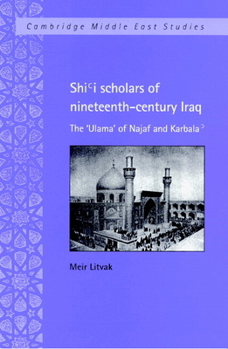Shi'i Scholars of Nineteenth-Century Iraq: The 'Ulama' of Najaf and Karbala'
(Book #10 in the Cambridge Middle East Studies Series)
Select Format
Select Condition 
Book Overview
In the nineteenth century, the shrine cities of Najaf and Karbala in Ottoman Iraq emerged as the most important Shi'i centres of learning. In a major contribution to the study of pre-modern Middle Eastern religious institutions, Meir Litvak analyses the social and political dynamics of these communities. Tracing the historical evolution of Shi'i leadership, he explores the determinants of social status amongst the ulama, the concept of patronage, the structure of learning, questions of ethnicity, and financial matters. He also assesses the role of the ulama as communal leaders who, in the face of a hostile Sunni government in Baghdad, were often obliged to adopt a more quietest political stance than their counterparts in Iran. This is an important book which sheds light on the formation of contemporary Shi'ism and the surrounding debates.
Format:Paperback
Language:English
ISBN:0521892961
ISBN13:9780521892964
Release Date:May 2002
Publisher:Cambridge University Press
Length:272 Pages
Weight:0.91 lbs.
Dimensions:0.7" x 6.3" x 9.1"
Related Subjects
History Iraq Islam Middle East Modern (16th-21st Centuries) Religion Religion & Spirituality Shi'ismCustomer Reviews
0 rating





